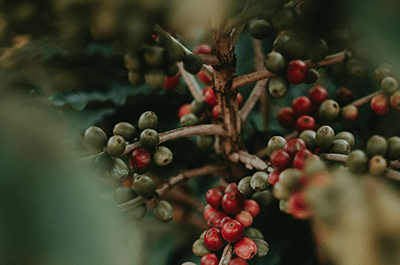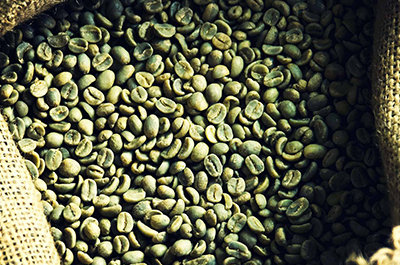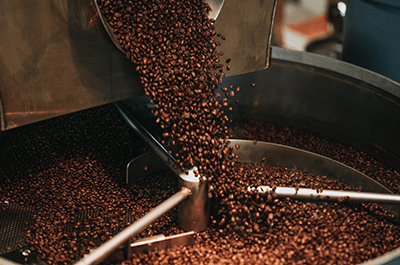The Arabica coffee is the pinnacle of coffee. It is the most sensitive species prone to disease. Prefers the altitude from 600 up to 2100 meters depending on the latitude and the variations in weather. The volcanic soil gives the Arabica an astringent taste while highlands give it its characteristic bitterness. The coffee beans are quite large, long shaped and relatively flat.
The Arabica coffee is soft, delicate, aromatic, and offers superior quality. Also, because of its low caffeine content (1% to 1.7%) is suitable for any time of day. The most famous Arabica coffees come from Latin America and Asia.
The Robusta type of coffee is more resistant and more productive than the Arabica one, booming in the equatorial climate in the plains at an altitude of up to 600 meters. It replaced the Arabica cultivation in Africa, and also found and cultivated in Indonesia and Brazil. The coffee beans are round and inflatable, shorter than the Arabica. They produce and deliver a less flavored, sophisticated coffee. The coffee these beans are producing is strong, bitter even astringent. Because of the high levels of caffeine (2% to 4%) is consumed mainly as morning coffee.
The Blue Mountain coffee is grown on terraces in the shade of banana and avocado trees on the slopes of the Blue Mountains just below the dense natural forests which cover the tops of Jamaica. The fertile soil, the high altitude, the frequency of rainfall, and cold, foggy nights tend to give this coffee a subtle softness and an extraordinary completeness. Harvesting is by hand every August, and the coffee beans pass through wet processing. The Blue Mountain coffee is exported by sea in wooden barrels of seventy kilos and not in bags. The largest buyer is Japan, absorbing 90% of its total production.
Ian Fleming, the creator of the famous James Bond, had lived in Jamaica for a while and of course, could not let his hero drink any other coffee but the famous Jamaican Blue Mountain.
In Indonesia, coffee is called «Kopi». So, coffee Kopi Luwak, coming from the islands of Sumatra, Java, and Sulawesi, is the rarest and most expensive coffee in the world. This is mainly due to processing. In these areas, there is a small marsupial, the Paradoxurus, which lives on trees and feeds on ripe beans from the coffee plant. Some natives who had noticed that the animal was excreting pristine some of the coffee beans, began collecting them and noticed that the coffee beans had a unique taste that is undoubtedly due to the natural fermentation of the coffee beans into the animal’s digestive system.
Some argue that the Kopi Luwak coffee is the best in the world. The coffee distinctions are strong and rich flavour with a thick body and a slight acidity. The Japanese and the Americans are the biggest fans.
Coffee was born there. This place is the mother land of mocha coffee. African Arabica varieties are the best in the world. Eastern Africa continuous to be a shrine of world coffee culture, and represents a coffee culture in which some countries such as Kenya, have been incorporated with some delay.
ETHIOPIA| KENYA | TANZMANIA | ZIBABUE | UGANDA | MADAGASCAR | YEMEN
INDIA | INDONESIA | PAPUA NEW GUINEA | VIETNAM | AUSTRALIA |
The cultivation of coffee in Asia, which was renewed, with the introduction of the Robusta variety in the early twentieth century, is progressing rapidly. For too long, the division between Arabica and Robusta varieties were balanced, but now this second type of coffee plant tends to dominate. However, no country can rival the splendour of Hawaii.
The Caribbean island has been the connecting link in the spread of coffee between Europe and America. They continue to cultivate coffee, but only one is prevalent in this area, the famous Jamaican Blue Mountain.
PUERTO RICO | CUBA | JAMAICA | TAHITI | DOMINICAN REPUBLIC
AGOLA | CAMEROON | KONGO | TOGO | IVORY COAST | CENTRAL AFRICAN REPUBLIC
Coffee Robusta dominates in these areas where the cultivation of coffee, was developed by Europeans colonialists. In recent decades several governments, have been forced to take measures, to improve quality, which was unpredictable, mainly through the training of farmers.
In Central America, the cultivation of coffee has all the traits of traditional labour. The harvest is by hand with no machinery involved and packed in bags of grain for shipment to the consuming countries. The harvest cannot be done in any other way, considering the high altitude plantations
COSTA RICA | GUATEMALA | HONDURA | MEXICO | NICARAGUA | PANAMA | EL SALVADOR
BRASIL| COLOMBIA | EQUADOR | PERU | VENEZUELA
Producing countries like Brazil and Colombia always tended to favour the factor ‘efficiency’. Nowadays, however, these countries are beginning to realize the importance of the factor ”quality” that will allow them to dominate even more worldwide.
Read useful information about coffee. From its production as a coffee bean until it reaches our cup!

In old times, poets called the fruit of the coffee tree “a precious grain of Yemen.” Its elegant foliage, the delicate aroma of its flowers, the successful mixing in the same root of fruits that are in different stages of ripening, combined with green and red shades, contribute to suffuse the coffee tree a special physiognomy, which flatters the sight and smell and is also a guaranty of exquisite taste.
Although there are about fifty species, there are two types that we know well and grown consistently: the Arabica coffee, which found in 80% of the producing countries, and coffee Canephora, which is widely known as Robusta. The delicacy of the Arabica variety. The strength of the Robusta variety


The beverage produced from raw coffee is meaningless as a beverage. The roasting of coffee develops an aroma and produces an oil, which are the characteristics of coffee that remained in obscurity without the intervention of heat.
The ideal start of each day is a good cup of coffee that overwhelms you with its aroma!
Our website uses the absolutely neccessary cookies to ensure its top functionality and a smooth user experience.